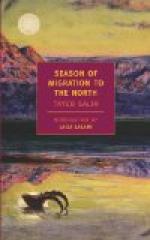Half way along the traverse of the lake we had crossed the inter-Provincial boundary, and now find ourselves near the northern limit of the Province of Saskatchewan, and in the latitude of Sweden’s Stockholm. There are but two people in Fond du Lac who speak English,—Mr. Harris who trades fur with the Indians, and Father Beibler who would fain shepherd their souls.
These Caribou-Eater Indians are true nomads who come into the post only at treaty-payment time or to dispose of their hunt. In the moon-when-the-birds-cast-their-feathers (July) they will press back east and north to the land of the caribou. September, the-moon-when-the-moose-loose-their-horns, will find them camping on the shore of some far unnamed lake, and by the time of the hour-frost-moon, or the ice-moon, they will be laying lines of traps.
We have learned to estimate the prosperity or otherwise of the Indians by the condition of their dogs. Fond du Lac dogs are fat; each baby in its moss-bag exudes oil from every pore. Peace and Plenty have crowned the Caribou-Eaters during the winter that is past. The law of Saskatchewan permits the taking of the beaver. Alberta for the present has enacted restrictive legislation on this hunt, to which restriction, by the way, among the Indians at the treaty-tent at Chipewyan, objection had been loud and eloquent.
[Illustration: Tepee of a Caribou-Eater Indian]
We call upon Mr. Harris and his Chipewyan wife, a tall handsome woman whom he addresses as “Josette.” Their three girls are being educated in the convent at Fort Chipewyan. The room in which we sit reflects the grafting of red life on white. A rough bookcase of birchwood, with thumbed copies of schoolboy classics, Carlyle, the Areopagitica, and the latest Tractate on Radium, gives one a glimpse of the long, long winter nights when all race and latitude limitations fade away and the mind of the Master of Fond du Lac jumps the barrier of ice and snow to mix with the great world of thought outside. “Stone walls do not a prison make nor iron bars a cage.” Fighting our way with the mosquitoes, under birches somewhat dwarfed but beautiful, through a pungent bocage of ground pine, wild roses, giant willow-herb, mints innumerable and Labrador tea (Ledum latifolium), we reach the H.B. garden where the potatoes are six or eight inches high. We wander into a little graveyard, surely the most lonely God’s acre in all Canada. The inscriptions in syllabic Chipewyan show the patient devotion of Father Beihler, who comes across us as we gaze at the graves. Eight long years the priest has put in at Fond du Lac, sent here when but three months in the priesthood. His English, acquired from Mr. Harris, is a bit hesitating. His home was in Alsace-Lorraine; he tells us his mother was out of her mind for three days when he was ordered here, and he himself wept. White women are a rara avis. Father Beihler wants to know




